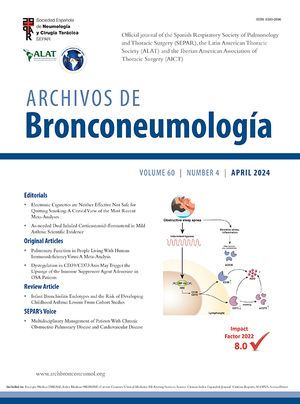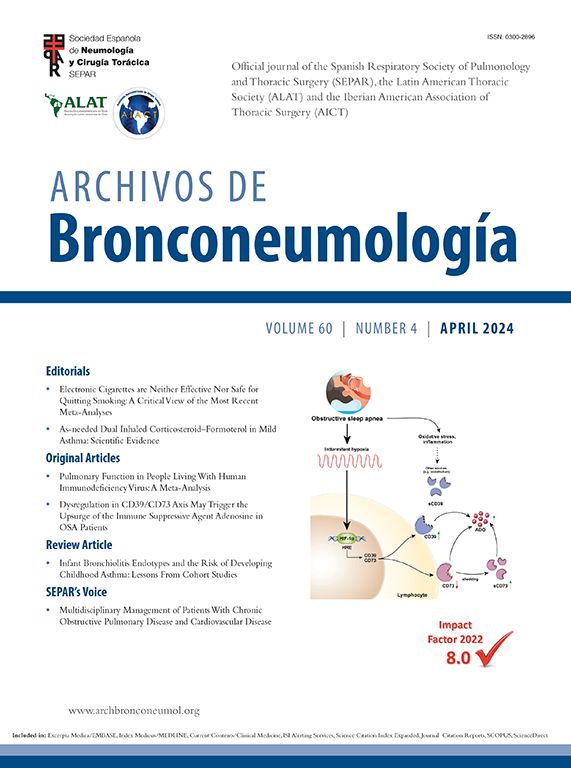
A response to the article by Khan et al., entitled “Ivermectin Treatment May Improve the Prognosis of Patients with COVID-19” and published in Archivos de Bronconeumologia on October 24, 2020,1 raised several questions regarding: (i) confounding bias that might influence the assessment of drugs used to treat patients with novel coronavirus 19 infection (COVID-19), (ii) the failure to consider corticosteroid therapy and its therapeutic role in COVID-19 patients, (iii) the influence of the age and sex of the cohort population, as these factors may affect the outcome, (iv) the dose of ivermectin, as the dose used differed from that tested in an in vitro study and finally (v) the quality of the statistical analyses, because of the uneven distribution of the data.
The authors of the response are justified in their scientific concerns but they should bear in mind the context of the trial, which was conducted in Bangladesh and tested the efficacy of a drug that is widely available in developing and resource-constrained countries, in the treatment of COVID-19. It is therefore useful to consider the rapid onset of the COVID-19 pandemic, its impact on public health policies affecting millions of people and the evolving management strategies of physicians and public health personnel in the different countries with a high COVID-19 case load.
Bangladesh reported its first case of COVID-19 on March 8, 2020, and the first death due to the virus on March 18, 2020. At the same time, the World Health Organization declared COVID-19 to be a global pandemic. In March 2020, the only centre in Bangladesh capable of testing for severe acute respiratory syndrome coronavirus 2 (SARS-CoV-2) was the Institute of Epidemiology, Disease Control and Research (IEDCR), in Dhaka. Over time, the country's testing capacity and rate improved and, according to the Directorate General of Health Services, Bangladesh, increased from 92 tests per day (March 24, 2020) to 9.554 tests per day (on May 25, 2020) in 48 laboratories.2 The study by Khan et al.1 provides a snapshot of the management of COVID-19 patients in Bangladesh between April and June 2020. At that time, the standard of care included antibiotics, analgesics, symptom-oriented drugs and oxygen supplementation. The first drug with antiviral activity used in Bangladesh against SARS-CoV-2 was hydroxychloroquine, with some patients subsequently receiving favipiravir.3,4 Since SARS-CoV-2 positivity induced panic in the population, patients with asymptomatic, mild, or moderate COVID-19 flooded the hospitals. Soon after this initial panic phase, ivermectin was introduced as a potential therapeutic agent. In our study, the patients usually went to a hospital 1–4 days after the initial appearance of COVID-19 symptoms. Since the study was retrospective in its design, confounding factors such as the duration of symptoms could not be properly assessed and an analysis of the outcomes of patients with late hospital attendance was not possible. Patients in both the ivermectin group and the standard of care group visited the hospital after symptom appearance. Since only one patient who received ivermectin died and SARS-CoV-2 clearance was recorded in the other patients within a median period of 4 days, a potential confounding bias may not be an important factor.
Regarding the role of dexamethasone, we can offer a very clear and straightforward response. The results of the RECOVERY study5 suggested a valuable role for dexamethasone in the survival of COVID-19 patients, a conclusion supported by other studies. However, among our patients (ivermectin group and standard of care group) none received dexamethasone, such that its role can be completely disregarded in our study. In fact, most of the patients in our study cohort had mild to moderate lung involvement and dexamethasone is not indicated in such cases.
Regarding the age and sex of the patients, COVID-19 patients in Bangladesh during the initial phase of the pandemic were comparatively young. In the study cohort, only one patient was 65 years of age whereas all of the others were <60 years of age. Similarly, in other studies from different regions of Bangladesh, no patient was over the age of 65.3,4 This age distribution is in sharp contrast to that in the Western world, where the older population have been disproportionately affected. Differences in lifestyle and other socio-economic factors along with the almost complete absence of nursing homes in Bangladesh might account for the different age range of Southeast Asian and Western patients.
With respect to the dose of ivermectin, it was not optimized according to the result of an in vitro study.6 The dose of 12mg administered to each patient in the trial was shown in other studies to induce potent antiviral effects but without safety issues.7 Nonetheless, a double-blind dose escalation or de-escalation study of ivermectin is warranted to assess the true efficacy of the drug in COVID-19 patients. Other important points regarding the dosage merit discussion. The antiviral properties of ivermectin have been demonstrated in animal models and in cell culture systems. However, ivermectin is unable to block viral replication by the usual pathways of enzyme blockade or disruption of the viral membrane; rather, it acts via a host-directed protein that prevents the transmission of factors required for viral replication.8–10 Thus, indirectly, ivermectin is an immune mediator. While under the current circumstances, the safest or most effective dose of ivermectin may not be ascertained any time soon, in our experience a dose of 12mg ivermectin resulted in rapid hospital discharge in 114 out of 115 patients.1 In 61 of the 115 ivermectin-treated COVID-19 patients who were followed up after leaving the hospital, none had any notable adverse effects related to ivermectin usage. However, we still recommend a dose-escalation/de-escalation study to obtain insights into the pharmacokinetics of ivermectin in human pathologies.
Regarding the tests used in the statistical analysis, patient data that did not follow a normal distribution were also analysed using the Mann-Whitney and Wilcoxon tests, but the statistical significance remained unchanged.
Ivermectin is cheap, usually safe and, as suggested by our study of Bangladeshi COVID-19 patients and by others,7,11,12 may be a potent agent with anti-SARS-CoV-2 activity. At a minimum, its administration to our COVID-19 patients substantially reduced their hospital stay and mortality. Although our study was prospective in nature, several studies from different corners of the world have similarly obtained encouraging results regarding the utility of ivermectin in COVID-19 patients. An analysis of the data compiled from those clinical trials is likely to provide a better picture of the scope and limitations of ivermectin use in COVID-19. Investigations into the mechanism of action of ivermectin in cell lines showed that the drug does not destroy the virus but, instead, blocks the transmission of important viral elements, such that its antiviral properties are indirect. Since most of our patients had mild or moderate disease, the role of ivermectin in COVID-19 patients with severe disease, including massive lung involvement, should be investigated. Finally, given the conflicting data on the antiviral activity of remdesivir,13,14 and favipiravir,15 studies examining the efficacy of ivermectin in patients with COVID-19 are all the more urgently needed.
IRB approval statusHospital approval and patient consents were taken.
Funding sourcesNone.
Conflict of interestAll author have nothing to disclose.











